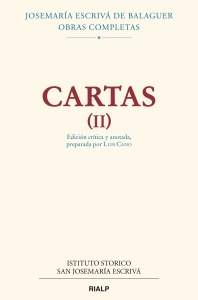The phrase “To give divine value to what is human”; taken from one of the recently published Letters of Saint Josemaría, could well sum up the charism that the founder of Opus Dei received in 1928 and which led him to preach the possibility of leading a holy life in the midst of the world and of ordinary work.
The four documents that form part of the new book just published by Rialp were completed by Saint Josemaría in the 1960s, near the end of his life. These documents gathered together notes and ideas that he had been recording during the course of his life. In these notes and ideas, he carefully addresses some of the central aspects of the spirit and evangelizing task of Opus Dei.
The task of critical editing and annotation has been organized by Luis Cano, a researcher at the Istituto Storico San Josemaría Escrivá. He has already been involved in the publication of earlier collections of other unpublished texts by the founder of Opus Dei (Letters I and In Dialogue with the Lord). This latest publication is the tenth volume in the Collection of Saint Josemaría’s complete works. The Istituto Storico has been carrying out this task for some years now.
These writings are essential for learning about the charism and the specific ecclesial proposal of Opus Dei. However, their contents may also be of interest to people from all walks of life who are wondering how to follow Jesus Christ in today’s world, through ecclesial paths, which are very different from those of Opus Dei.
The four documents have been numbered from 5 to 8 in this edition. Two of them (no. 5 and no. 7) are dedicated to a subject of great importance and topicality: young people. The first focuses on the Christian education of young people, for whom he proposes as goals “to order all culture to salvation, to enlighten all human knowledge with faith, to form Christians full of optimism and drive capable of living their divine adventure in the world” (Letter no. 5, § 6).
Letter No. 7, on the other hand, sets out the guidelines for the apostolate of Opus Dei with young people: to help them to shape their personalities and to be free, to give them a good knowledge of Christian doctrine, and to encourage them to have an attitude of service in life, both to God and to others. And above all: “See to it that, in their early youth or in their adolescence, they are moved by an ideal: that they seek Christ, that they find Christ, that they get to know Christ, that they follow Christ, that they love Christ, that they remain with Christ” (Letter No. 7, § 12).
Letter no. 6 is a summary of the entire charism of Opus Dei. Consequently, it deals with numerous themes, the most important of which is the union between contemplation of God and love of the world, two apparently incompatible concepts. Another important aspect of this document is the specificity of the evangelizing activity of Opus Dei, in which there is an “intimate and total union between professional activity and apostolic activity” (Letter No. 6, § 42). The mission of Opus Dei, the Founder affirms, is “to receive the treasure of the Gospel with the freshness of youth, so that it may reach every corner of the earth” (Letter No. 6, § 31).
The last Letter of the collection is no. 8. This letter presents the Christian life in terms of service: serving God, serving the Church, as a conscious exercise of freedom. This letter begins with “The legitimate freedom of men, if we are truly honest, and with divine help, will lead to the desire to serve God and His creatures” (Letter No. 8, § 1).
The book includes a general introduction and brief introductions to each of the Letters. These explain the minor differences between the various existing manuscripts and other aspects related to the edition of the texts.
Throughout the text, there are concise explanatory notes. The biblical, patristic, etc. references are also included. The publication contains a section of facsimiles, an index of quotations from Sacred Scripture, an index of names and another of subjects, as well as the bibliography used.
Josemaría Escrivá de Balaguer, Cartas (vol. 2), Madrid, Rialp, 2022, XX+252 pages.
ISBN: 978-84-321-6017-2
Format: 16×24 cm


